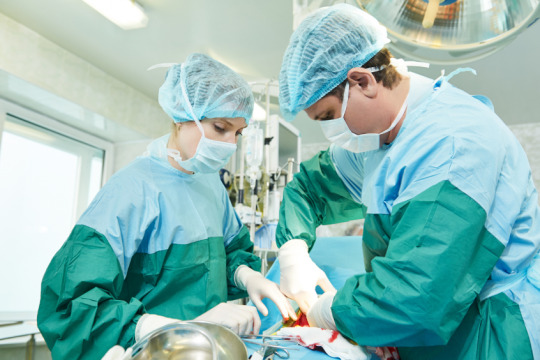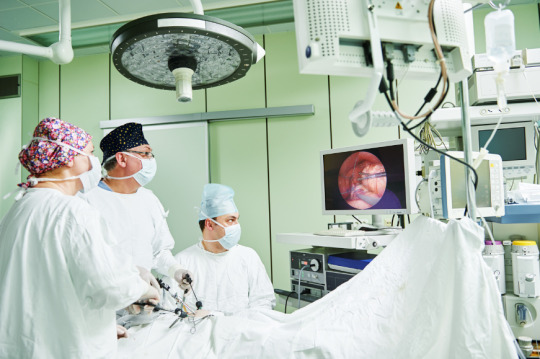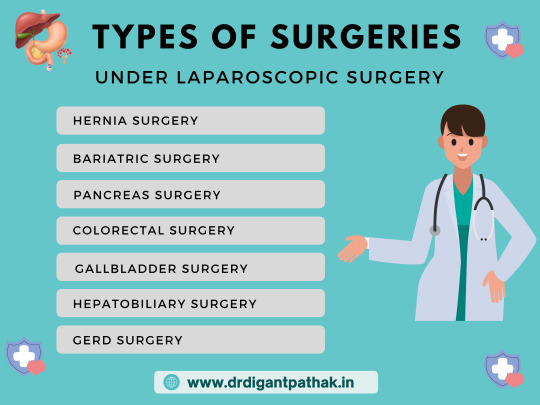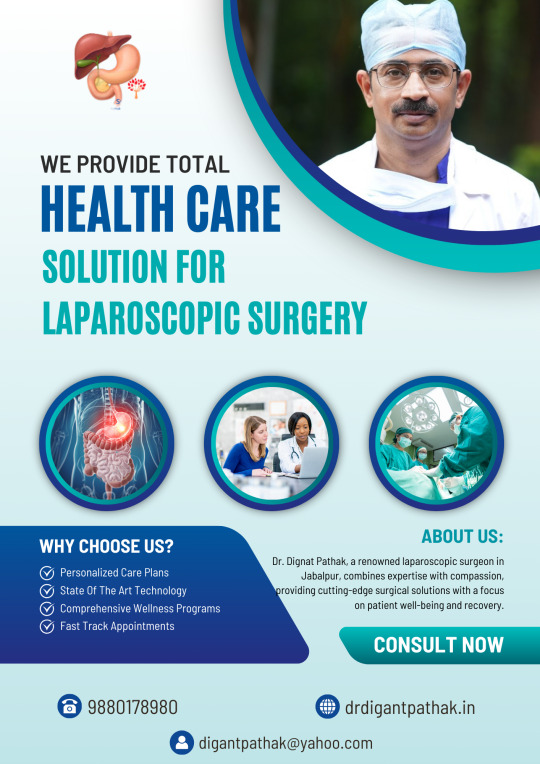#anorectalsurgeoninjabalpur
Text
Understanding the Role of Anorectal Surgeons

The field of medicine that is so complicated and so subtle, you will find some doctors deal with certain parts of the body or its system. There is one specific niche that may go unnoticed but is undoubtedly a gem among the gems, specializing in anorectal surgery. Anorectal surgeons are specialists in the anus, rectum, and the surrounding area and are competent in the diagnosis and treatment of conditions affecting this region. Now, let us focus on this very area of care and unravel the vital part being played by these surgeons in the domain of colorectal health.
Anorectal Surgery: A Specialized Discipline
Anorectal surgery falls under the umbrella of colorectal surgery, which is a subspecialty of the discipline. Unlike, colorectal surgeons who the diseases of the entire colon and rectum, anorectal surgeons mainly focus on anus and rectum diseases. This covers a substantial spectrum of diseases comprising such physical abnormalities as hemorrhoids, anal fissures, anal abscesses, fistulas, fecal incontinence, and also anal cancer among others.
Expertise and Training
Becoming an anorectal surgeon in Jabalpur requires extensive training and expertise. After completing medical school and a general surgery residency, aspiring anorectal surgeons undergo further specialized training in colorectal surgery. This often involves additional years of fellowship training specifically focused on anorectal disorders and procedures.
During their training, these surgeons become proficient in both surgical and non-surgical treatment modalities for various anorectal conditions. They gain comprehensive knowledge of the anatomy, physiology, and pathology of the anus and rectum, allowing them to provide accurate diagnoses and personalized treatment plans for their patients.
Conditions Treated by Anorectal Surgeons
Anorectal surgeons (piles doctor in Jabalpur) manage a diverse array of conditions affecting the anus and rectum. Some of the most common disorders they treat include:
1. Hemorrhoids: Swollen and inflamed veins in the rectum and anus, which can cause discomfort, bleeding, and itching.
2. Anal Fissures: Tears or cracks in the lining of the anal canal, often resulting in pain and bleeding during bowel movements.
3. Anal Abscesses and Fistulas: Infections or abnormal tunnels that form between the anal canal and surrounding tissue, leading to pain, swelling, and drainage of pus.
4. Fecal Incontinence: Inability to control bowel movements, which can result from various underlying causes such as muscle damage or nerve injury.
5. Anal Cancer: Malignant growths that develop in the tissues of the anus, requiring specialized evaluation and treatment.
Diagnostic Techniques and Treatment Options
Anorectal surgeons employ a variety of diagnostic techniques to evaluate patients with anorectal disorders. This may include physical examinations, imaging studies such as endoanal ultrasound or MRI, and specialized tests like anal manometry to assess sphincter function.
Treatment options offered by anorectal surgeon in Jabalpur are tailored to each patient's specific condition and may range from conservative measures to surgical interventions. Conservative management often involves dietary and lifestyle modifications, topical medications, and minimally invasive procedures such as sclerotherapy or rubber band ligation. When conservative measures are insufficient, surgical intervention may be necessary, which can include procedures like hemorrhoidectomy, fissurectomy, abscess drainage, fistulotomy, or sphincteroplasty.
The Importance of Anorectal Health
Maintaining optimal anorectal health is crucial for overall well-being and quality of life. Anorectal disorders can significantly impact a person's comfort, dignity, and daily functioning. Seeking timely evaluation and treatment from an experienced anorectal surgeon can alleviate symptoms, prevent complications, and improve the patient's quality of life.
Anorectal surgeons (fissure doctor in Jabalpur) are highly skilled professionals who specialize in the diagnosis and treatment of conditions affecting the anus and rectum. Through their expertise in both surgical and non-surgical interventions, they play a vital role in preserving and restoring colorectal health. By raising awareness about the importance of anorectal health and the services provided by anorectal surgeons, we can empower individuals to seek timely care and live healthier, more comfortable lives.
0 notes
Text
A Comprehensive Guide to the Applications of Laparoscopic Surgery

In the realm of modern medicine, laparoscopic surgery stands as a groundbreaking technique that has revolutionized various aspects of surgical procedures. Also known as minimally invasive surgery (MIS) or keyhole surgery, laparoscopy involves using small incisions and specialized tools to perform operations with enhanced precision and reduced trauma to the body. Let's delve into the vast applications of laparoscopic surgery and how it's reshaping the landscape of medical interventions.
Gynecological Procedures:
Laparoscopic surgery in Jabalpur has significantly transformed gynecological procedures. It's commonly used for diagnosing and treating conditions such as endometriosis, ovarian cysts, fibroids, and ectopic pregnancies. Through small incisions, surgeons can access the pelvic region with minimal disruption, leading to quicker recovery times and less post-operative pain for patients.
Gallbladder Removal (Cholecystectomy):
One of the most prevalent applications of laparoscopic surgery is in the removal of the gallbladder. This minimally invasive approach involves making small incisions in the abdomen, through which a laparoscope and specialized instruments are inserted to remove the gallbladder. Compared to traditional open surgery, laparoscopic cholecystectomy or gallbladder stone surgery in jabalpur offers shorter hospital stays, faster recovery, and reduced scarring.
Appendectomy:
Appendectomy, the surgical removal of the appendix, is another procedure where laparoscopy has become the preferred approach. By using small incisions and a laparoscope, a laparoscopic surgeon in jabalpur can precisely locate and remove the inflamed appendix, often resulting in decreased post-operative pain and a quicker return to normal activities for the patient.
Hernia Repair:
Laparoscopic surgery has also found widespread use in repairing certain types of hernias, including inguinal and ventral hernias. Hernia surgeon in jabalpur utilizes small incisions to insert a laparoscope and specialized mesh to reinforce the weakened abdominal wall, providing a more durable repair while minimizing trauma to surrounding tissues.
Bariatric Surgery:
In the field of weight loss surgery, laparoscopic techniques have become increasingly popular. Procedures such as laparoscopic gastric bypass and sleeve gastrectomy are performed using minimally invasive approaches, enabling patients to achieve significant weight loss with reduced risk of complications and faster recovery times.
Colorectal Surgery:
Laparoscopic surgery has also made significant strides in the treatment of colorectal conditions, including colon cancer, diverticulitis, and inflammatory bowel disease. Anorectal surgeon in Jabalpur can perform procedures such as colectomy and rectal resection through small incisions, resulting in less post-operative pain, shorter hospital stays, and quicker return to bowel function for patients.
In addition to these applications, laparoscopic surgery in jabalpur continues to evolve, with advancements in technology and techniques expanding its scope across various medical specialties. From urology to orthopedics, this minimally invasive approach offers numerous benefits for patients, including reduced scarring, decreased risk of infection, and faster recovery times.
In conclusion, laparoscopic surgery has emerged as a cornerstone of modern surgical practice, offering a less invasive alternative to traditional open procedures across a wide range of medical conditions. As technology continues to advance, the applications of laparoscopic surgery will likely expand further, paving the way for safer, more efficient, and patient-centered surgical interventions.
#laparoscopicsurgeryinjabalpur#gallbladdersurgeryinjabalpur#laparoscopicherniaspecialistinjabalpur#anorectalsurgeoninjabalpur#laparoscopicsurgeoninjabalpur#herniaoperationinjabalpur
0 notes
Text
Exploring the Advantages of Laparoscopic Surgery Over Traditional Open Surgery

In the realm of surgical procedures, advancements in technology have revolutionized the way we approach treatment and recovery. One significant development is laparoscopic surgery in Jabalpur, also known as minimally invasive surgery, which offers numerous benefits compared to traditional open surgery. Let's delve into the advantages that make laparoscopic surgery a preferred choice for many patients and surgeons alike.
1. Minimal Incisions, Minimal Scarring:
Laparoscopic surgery involves making small incisions, typically ranging from 0.5 to 1.5 centimeters, compared to the large incision required in traditional open surgery. This results in significantly less scarring, promoting better cosmetic outcomes and improved patient satisfaction.
2. Faster Recovery Time:
With laparoscopic surgery in Jabalpur, patients often experience shorter hospital stays and faster recovery times compared to open surgery. The smaller incisions lead to reduced trauma to surrounding tissues, less postoperative pain, and a quicker return to normal activities and daily routines.
3. Reduced Risk of Complications:
The minimally invasive nature of laparoscopic surgery lowers the risk of complications such as infection, bleeding, and hernias. Additionally, because there is less disruption to the body's natural barriers, the risk of postoperative adhesions (abnormal tissue connections) is minimized, enhancing overall surgical outcomes.
4. Enhanced Precision and Visualization:
Laparoscopic procedures utilize high-definition cameras and specialized instruments that provide laparoscopic surgeon in Jabalpur with magnified, detailed views of the surgical site. This enhanced visualization allows for greater precision and accuracy during the procedure, leading to improved surgical outcomes and reduced risk of damage to surrounding tissues and organs.
5. Quicker Return to Normal Function:
Patients undergoing laparoscopic surgery often experience a faster recovery of bowel function and reduced postoperative discomfort compared to those undergoing open surgery. This enables a quicker return to normal gastrointestinal function and dietary habits, contributing to overall patient comfort and satisfaction.
6. Lower Risk of Blood Loss:
Laparoscopic procedures typically involve minimal blood loss due to the use of specialized instruments that cauterize blood vessels as they are cut. This reduces the need for blood transfusions during surgery and lowers the risk of complications associated with significant blood loss.
7. Versatility Across Various Surgical Specialties:
Laparoscopic surgery has demonstrated its efficacy across a wide range of surgical specialties, including gynecology, urology, gastroenterology, and general surgery. From gallbladder stone surgery in Jabalpur to hernia surgery in Jabalpur to GERD surgery in Jabalpur, laparoscopic techniques offer a minimally invasive approach to treating various conditions, providing patients with safer and more efficient treatment options.
In conclusion, the benefits of laparoscopic surgery over traditional open surgery are manifold, ranging from smaller incisions and faster recovery times to reduced risk of complications and enhanced surgical precision. As technology continues to advance, laparoscopic techniques will likely become even more refined, further improving patient outcomes and shaping the future of surgical care with the help of the best laparoscopic surgeon in Jabalpur.
#gallbladdersurgeryinjabalpur#laparoscopicsurgeryinjabalpur#laparoscopicsurgeoninjabalpur#anorectalsurgeoninjabalpur#laparoscopicherniaspecialistinjabalpur#gallbladdersurgeoninjabalpur
0 notes
Text
A Comprehensive Guide to Different Types of Laparoscopy Surgeries

Laparoscopy surgery, also known as minimally invasive surgery, has revolutionized the field of medicine by offering less invasive alternatives to traditional open surgeries. This technique involves using a laparoscope – a thin, flexible tube with a camera and light source – to perform procedures through small incisions. The benefits of laparoscopy include reduced pain, quicker recovery times, and minimal scarring. In this blog post, we'll delve into various types of laparoscopy surgeries and their applications.
1. Diagnostic Laparoscopy:
Purpose: Used to identify the cause of unexplained abdominal pain, pelvic pain, or infertility.
Procedure: A laparoscope is inserted through a small incision to examine the abdominal organs, allowing for a visual inspection of the pelvic and abdominal cavities.
2. Laparoscopic Cholecystectomy:
Purpose: Removal of the gallbladder commonly performed for gallstones or gallbladder inflammation.
Procedure: The gallbladder surgeon in Jabalpur makes small incisions, inserts the laparoscope, and uses specialized instruments to remove the gallbladder.
3. Laparoscopic Appendectomy:
Purpose: Treatment for appendicitis, an inflammation of the appendix.
Procedure: The infected appendix is removed through small incisions, reducing the risk of infection and speeding up recovery.
4. Laparoscopic Hysterectomy:
Purpose: Removal of the uterus, often recommended for conditions such as fibroids or endometriosis.
Procedure: The laparoscopic surgeon in Jabalpur uses the laparoscope to guide the removal of the uterus through small incisions, resulting in less pain and a shorter hospital stay compared to traditional hysterectomy.
5. Laparoscopic Nissen Fundoplication:
Purpose: Treatment for gastroesophageal reflux disease (GERD surgery in Jabalpur) by reinforcing the lower esophageal sphincter.
Procedure: The surgeon wraps the top of the stomach around the lower esophagus to prevent acid reflux, performed through small incisions.
6. Laparoscopic Hernia Repair:
Purpose: Repair of hernias, which occur when an organ or tissue protrudes through a weak spot in the abdominal wall.
Procedure: The hernia is repaired using a mesh through small incisions, minimizing pain and recovery time.
7. Laparoscopic Colorectal Surgery:
Purpose: Treatment for conditions affecting the colon or rectum, such as colorectal cancer or diverticulitis.
Procedure: The laparoscope is used to guide the removal or repair of affected portions of the colon or rectum through small incisions.
Laparoscopic surgery in Jabalpur has transformed the landscape of surgical interventions, providing patients with a less invasive and more comfortable alternative to traditional open procedures. The various types of laparoscopy surgeries cater to a wide range of medical conditions, from diagnostic explorations to complex organ removals. As technology continues to advance, the field of laparoscopy will likely see further refinements and expansions, offering even more benefits to patients in the years to come. If you're facing a surgical procedure, consulting with the best laparoscopic surgeon in Jabalpur about the possibility of laparoscopy could lead to a faster recovery and improved postoperative experience.
#gallbladdersurgeryinjabalpur#laparoscopicsurgeoninjabalpur#laparoscopicherniaspecialistinjabalpur#anorectalsurgeoninjabalpur#laparoscopicsurgeryinjabalpur
0 notes
Text
What Are The Different Types of Laparoscopic Surgery?

The world of medical interventions has been transformed by laparoscopic surgery, commonly referred to as minimally invasive surgery. With its numerous benefits, including reduced recovery times and minimal scarring, laparoscopic surgery in Jabalpur has become increasingly popular across various medical specialties. In this blog, we will delve into the diverse types of laparoscopic surgeries, showcasing the versatility and effectiveness of this advanced surgical approach.
1. Laparoscopic Cholecystectomy:
One of the most common laparoscopic procedures, cholecystectomy involves the removal of the gallbladder. This gallbladder surgery in Jabalpur offers patients a quicker recovery and less postoperative pain compared to traditional open surgery.
2. Laparoscopic Appendectomy:
Appendectomy, the removal of the appendix, is often performed laparoscopically. This approach results in smaller incisions, reduced postoperative pain, and a faster return to normal activities for patients.
3. Laparoscopic Hysterectomy:
Laparoscopic hysterectomy is a minimally invasive alternative to traditional abdominal hysterectomy. This procedure involves the removal of the uterus, and it is associated with less pain, reduced hospital stays, and faster recovery for women.
4. Laparoscopic Nissen Fundoplication:
Used to treat gastroesophageal reflux disease (GERD), GERD surgery in Jabalpur procedure involves wrapping the top of the stomach around the lower esophagus. Laparoscopic Nissen fundoplication provides effective reflux control with fewer complications compared to open surgery.
5. Laparoscopic Hernia Repair:
Hernia operation in Jabalpur, such as inguinal or ventral hernia repairs, can be performed laparoscopically. This approach offers quicker recovery times and less postoperative pain for patients with various types of hernias.
6. Laparoscopic Colorectal Surgery:
Laparoscopic techniques are increasingly employed in colorectal surgeries, including colectomies and rectal resections. This procedure is usually used by Anorectal surgeon in Jabalpur to treat conditions like colorectal cancer and inflammatory bowel disease with reduced trauma and faster recovery.
7. Laparoscopic Bariatric Surgery:
Bariatric surgeries, such as gastric bypass or sleeve gastrectomy, can be performed laparoscopically to help individuals achieve weight loss and manage obesity-related health issues. This approach minimizes scarring and enhances recovery.
8. Laparoscopic Prostatectomy:
In the realm of urology, laparoscopic prostatectomy is used for the removal of the prostate gland. This procedure offers patients the benefits of reduced blood loss, shorter hospital stays, and a quicker return to normal activities.
The evolution of laparoscopic surgery has transformed the landscape of modern medical practices. From abdominal surgeries to urological interventions, the versatility of laparoscopic procedures continues to expand. As technology advances and surgical techniques refine, the future holds even more possibilities for minimally invasive approaches, promising improved patient outcomes and a higher standard of care across various medical disciplines.
#laparoscopicsurgeryinjabalpur#fissuredoctorinjabalpur#gallbladdersurgeoninjabalpur#anorectalsurgeoninjabalpur#gallbladdersurgeryinjabalpur#laparoscopicherniaspecialistinjabalpur
0 notes
Text
#fissuredoctorinjabalpur#anorectalsurgeoninjabalpur#laparoscopicsurgeryinjabalpur#laparoscopicsurgeoninjabalpur
0 notes
Text

Types of Surgeries under Laparoscopic surgery:
Hernia Surgery- Hernia surgery in Jabalpur is a medical procedure to repair a hernia, where a protrusion of an organ or tissue occurs through a weak spot in the abdominal wall.
Bariatric Surgery- Bariatric surgery is a weight loss procedure that reduces stomach size to aid in significant and sustained weight loss.
Pancreas Surgery- Pancreas surgery is conducted for conditions like pancreatic cancer, chronic pancreatitis, or pancreas trauma, involving removal, repair, or other interventions.
Colorectal Surgery- Colorectal surgery focuses on treating conditions of the colon and rectum, including tumors, polyps, and inflammatory bowel diseases.
Gallbladder Surgery- Gallbladder stone surgery in Jabalpur, or cholecystectomy, is the removal of the gallbladder, often due to gallstones or other gallbladder-related problems. It's a common procedure.
Hepatobiliary Surgery- Hepatobiliary surgery addresses conditions in the liver, gallbladder, and bile ducts, involving procedures like the removal of tumors or treating obstructions.
GERD Surgery- GERD surgery in Jabalpur is performed to treat severe cases when lifestyle changes and medications fail to provide relief.
#gallbladdersurgeryinjabalpur#laparoscopicherniaspecialistinjabalpur#anorectalsurgeoninjabalpur#laparoscopicsurgeryinjabalpur
0 notes
Text
The Precision of Laparoscopic Surgery: A Modern Approach to Surgical Excellence

Laparoscopic surgery, a sophisticated and minimally invasive technique, has become a cornerstone of modern surgical practices. This article explores the intricacies of laparoscopic surgery and delves into the compelling reasons why individuals are increasingly opting for this innovative approach.
Unraveling Laparoscopic Surgery:
Laparoscopic surgery in Jabalpur involves the use of small incisions, trocars (hollow tubes), and specialized instruments to access the targeted area internally. A tiny camera, known as a laparoscope, captures real-time high-resolution images, providing laparoscopic surgeon in jabalpur with a detailed view of the organs and tissues. This method replaces the need for larger incisions, significantly changing the surgical landscape.
Key Advantages of Laparoscopic Surgery:
Precision and Enhanced Visualization:
The laparoscope's detailed imaging allows surgeons to navigate with precision, making it an invaluable tool for intricate surgeries in confined spaces.
Minimized Blood Loss:
The smaller incisions and the meticulous nature of laparoscopic surgery often result in reduced blood loss during procedures, promoting patient safety.
Faster Recovery and Shorter Hospital Stays:
Patients undergoing laparoscopic surgery typically experience shorter hospital stays and quicker recovery times, enabling a faster return to their daily lives.
Diminished Postoperative Pain:
The reduced trauma to tissues results in less postoperative pain for patients, contributing to a more comfortable recovery period.
Cosmetic Benefits:
The minimal scarring associated with laparoscopic surgery is not only physically advantageous but also contributes to improved aesthetics, promoting increased patient satisfaction.
Versatility in Surgical Procedures:
Colorectal Surgery:
Procedures such as colon resections and rectal surgeries are increasingly being performed laparoscopically, by Anorectal surgeon in jabalpur providing patients with a less invasive option.
Bariatric Surgery:
Laparoscopic techniques are widely utilized in weight loss surgeries, offering patients the benefits of reduced postoperative pain and faster recovery.
Urological Procedures:
Nephrectomy and prostate surgeries are often conducted laparoscopically, enabling precision and minimizing disruption to surrounding tissues.
Orthopedic Applications:
Even in orthopedics, certain procedures, such as joint surgeries, benefit from the precision and reduced trauma associated with laparoscopic techniques.
Laparoscopic surgery stands at the forefront of medical innovation, transforming the surgical experience for both patients and healthcare providers. With its array of advantages, ranging from minimal scarring to expedited recovery, laparoscopic surgery exemplifies the marriage of technology and medical expertise. As this field continues to evolve, individuals facing various surgical interventions may find solace in the precision and benefits offered by laparoscopic techniques. Consult with the best laparoscopic surgeon in jabalpur to explore how laparoscopic surgery could provide you with a pathway to a more efficient and comfortable recovery.
#laparoscopicsurgeoninjabalpur#anorectalsurgeoninjabalpur#laparoscopicsurgeryinjabalpur#laparoscopicherniaspecialistinjabalpur
0 notes
Text

Laparoscopic surgery, or minimally invasive surgery, offers several benefits:
Smaller Incisions: Laparoscopic surgery in jabalpur causes minimum scarring and reduced trauma to surrounding tissues.
Faster Recovery: Patients experience shorter hospital stays and quicker return to normal activities.
Less Pain: Smaller incisions result in less postoperative pain and discomfort.
Lower Infection Risk: Reduced exposure to external contaminants lowers the risk of infection.
Enhanced Precision: Improved visualization with a camera allows for more accurate and precise surgical procedures.
#laparoscopicsurgeryinjabalpur#laparoscopicsurgeoninjabalpur#anorectalsurgeoninjabalpur#gallbladdersurgeryinjabalpur#laparoscopicherniaspecialistinjabalpur
0 notes
Text
Discovering Comfort: Your Ultimate Guide to Anorectal Surgeons, Piles Doctors, and Fissure Specialists

Embarking on a journey to digestive well-being requires the guidance of skilled specialists. In this blog post, we unravel the roles of Anorectal Surgeons, Piles Doctors, and Fissure Specialists – the dedicated professionals committed to restoring your comfort and peace of mind.
Unveiling Anorectal Surgeons
Anorectal surgeon in Jabalpur stand as pillars of expertise in digestive health. With a focus on precision diagnosis and personalized treatment plans, these specialists navigate the complexities of conditions affecting the anus and rectum. From everyday discomforts like hemorrhoids to intricate challenges like anal fistulas, Anorectal Surgeons are the guardians of your digestive comfort.
Piles Doctor: Crafting Solutions for Hemorrhoids
For those grappling with the inconvenience of hemorrhoids, a Piles Doctor is the beacon of hope. These specialists are adept at tailoring solutions that extend beyond mere symptom relief. Dive into the realm of piles doctors in Jabalpur and discover how they can guide you towards lasting comfort, freeing you from the constraints of hemorrhoidal discomfort.
Fissure Doctor: Easing the Painful Journey
Painful fissures can cast a shadow on your daily life, but a fissure doctor in Jabalpur is well-versed in illuminating the path to relief. Explore the expertise of these specialists, dedicated to the nuanced diagnosis and treatment of fissures. Learn how they blend precision with compassion to ensure your journey toward healing is as painless as possible.
Why Trust Anorectal Specialists?
Diagnostic Excellence: Anorectal Surgeons, Piles Doctors, and Fissure Specialists excel in accurate diagnosis, ensuring a clear understanding of your unique condition.
Tailored Treatment Strategies: Benefit from customized treatment plans designed to address the root causes of your digestive concerns, promoting sustained relief.
Surgical Mastery: When surgery becomes necessary, rely on the skilled hands of Anorectal Surgeons for procedures such as hemorrhoidectomy or fistula repair.
Comprehensive Collaboration: These specialists work collaboratively, ensuring a holistic approach to your digestive health by combining their collective expertise.
Your Journey to Comfort Begins Now
Whether you're seeking relief from piles, fissures, or other anorectal concerns, the expertise of Anorectal Surgeons, Piles Doctors, and Fissure Specialists is your gateway to comfort. Take the first step towards digestive well-being – consult these specialists and embark on a journey to a life free from the constraints of discomfort.
Empower yourself with specialists who prioritize your digestive health. Reach out to our expert team of Anorectal Surgeons, Piles Doctors, and Fissure Specialists today for a personalized and comprehensive approach to your well-being. Your path to lasting comfort starts here.
#laparoscopicsurgeoninjabalpur#laparoscopicherniaspecialistinjabalpur#gallbladdersurgeryinjabalpur#anorectalsurgeoninjabalpur#herniasurgeoninjabalpur
0 notes
Text
How to Understand the Purpose, Procedure, and Benefits of Laparoscopic Surgery?

In the world of medical advancements, laparoscopic surgery has emerged as a game-changer, offering patients a more precise and less invasive alternative to traditional open surgeries. This innovative approach, also known as minimally invasive surgery, involves the use of small incisions and specialized tools, enabling laparoscopic surgeon in Jabalpur to perform various procedures with enhanced precision. Let's delve into the purpose, procedure, and benefits of laparoscopic surgery.
Purpose of Laparoscopic Surgery:
Laparoscopic surgery in Jabalpur is employed across various medical specialties, addressing a wide range of conditions. Common purposes include:
Diagnostic Exploration: Laparoscopy allows surgeons to visually examine the abdominal and pelvic organs to diagnose and determine the cause of unexplained abdominal pain, swelling, or abnormalities.
Treatment of Gynecological Conditions: Laparoscopic procedures are frequently used for treating gynecological issues such as endometriosis, ovarian cysts, and fibroids, providing a less invasive alternative to traditional surgeries.
Gallbladder Removal: Laparoscopic cholecystectomy, or gallbladder surgery in Jabalpur, is a well-established procedure, that allows patients to recover faster with minimal scarring.
Hernia Repair: Laparoscopic techniques are employed in hernia surgery in Jabalpur, reducing recovery time and postoperative discomfort compared to traditional open surgeries.
Colorectal Surgery: Laparoscopic procedures are utilized for certain colorectal surgeries, promoting quicker recovery and reduced postoperative pain.
Procedure:
The laparoscopic procedure involves several key steps:
Small Incisions: Instead of a large incision, small keyhole incisions are made in the abdominal wall.
Insertion of Trocars: Trocars, or narrow tubes, are inserted through these incisions to create access points for the laparoscope and specialized instruments.
Gas Insufflation: Carbon dioxide gas is introduced to create a working space and lift the abdominal wall away from the organs, providing better visibility and maneuverability.
Laparoscope Insertion: A laparoscope, a thin tube with a light and camera, is inserted through one of the trocars to provide a real-time video feed of the surgical area.
Surgical Manipulation: Specialized instruments are introduced through the remaining trocars, allowing the surgeon to manipulate, cut, and suture as needed.
Closure: After completing the procedure, the instruments and laparoscope are removed, and the small incisions are closed with stitches or surgical tape.
Benefits of Laparoscopic Surgery:
The advantages of laparoscopic surgery are manifold:
Minimally Invasive: Smaller incisions result in reduced trauma to surrounding tissues, minimizing pain and discomfort.
Faster Recovery: Patients typically experience quicker recovery times compared to traditional open surgeries, allowing them to return to normal activities sooner.
Reduced Scarring: The small incisions result in minimal scarring, contributing to improved cosmetic outcomes.
Lower Infection Risk: Smaller incisions lower the risk of postoperative infections.
Shorter Hospital Stay: Many laparoscopic procedures are performed on an outpatient basis or require shorter hospital stays.
Improved Visualization: The laparoscope provides high-quality, magnified images, enhancing the surgeon's ability to navigate and perform precise maneuvers.
In conclusion, laparoscopic surgery has transformed the landscape of surgical interventions, offering patients and surgeons a less invasive, more efficient, and often safer alternative. As technology continues to advance, the applications of laparoscopic techniques are likely to expand, further enhancing the benefits and accessibility of this innovative approach to medical procedures.
#gallbladdersurgeoninjabalpur#laparoscopicsurgeryinjabalpur#laparoscopicsurgeoninjabalpur#laparoscopicherniaspecialistinjabalpur#anorectalsurgeoninjabalpur
0 notes
Text

Healing Insights: 5 Essential Tips After Laparoscopic Surgery
Follow Doctor's Orders: Adhere strictly to post-laparoscopic surgery in Jabalpur guidelines provided by your healthcare professional.
Gentle Movement: Gradually reintroduce light activities to promote blood circulation and prevent stiffness after laparoscopic hernia surgery in Jabalpur.
Stay Hydrated: Drink plenty of water to aid recovery and flush out toxins from anesthesia.
Balanced Nutrition: Opt for a nutritious diet rich in proteins, vitamins, and minerals to support healing.
Adequate Rest: Prioritize ample sleep to facilitate the body's natural recovery process. Consult your laparoscopic surgeon in Jabalpur for personalized advice.
#laparoscopicsurgeoninjabalpur#anorectalsurgeoninjabalpur#laparoscopicsurgeryinjabalpur#gallbladdersurgeryinjabalpur#laparoscopicherniaspecialistinjabalpur
0 notes
Text

Post-Laparoscopic Surgery Health Tips:
Prioritize Rest:
Allow your body sufficient time to recover after laparoscopic surgery in jabalpur.
Hydrate Consistently:
Ensure regular intake of fluids for optimal healing.
Medication Adherence:
Follow prescribed medications for pain management.
Gradual Activity Resumption:
Ease back into light movements to enhance flexibility.
Remember to consult your healthcare professional for personalized advice tailored to your recovery journey.
#laparoscopicherniaspecialistinjabalpur#gallbladdersurgeryinjabalpur#laparoscopicsurgeryinjabalpur#gallbladdersurgeoninjabalpur#anorectalsurgeoninjabalpur
0 notes
Text
What is an Anorectal Surgeon? What Does an Anorectal Surgeon Do?

Anorectal surgeons, often referred to as colorectal surgeons or proctologists, play a pivotal role in the realm of medical specialists. Their expertise extends beyond general surgery, focusing specifically on the diagnosis and treatment of disorders affecting the anus, rectum, and surrounding areas. Let's delve into the world of anorectal surgeons, exploring their main specialties and the crucial role they play in ensuring optimal digestive health.
Understanding the Role:
Anorectal surgeon in Jabalpur are skilled medical professionals who specialize in conditions related to the anorectal region, which includes the anus, rectum, and perianal area. Their scope of practice encompasses a wide range of disorders, from common issues like hemorrhoids and anal fissures to more complex conditions such as colorectal cancer and inflammatory bowel diseases.
Main Specialties:
Hemorrhoid Management:
Fissure doctor in Jabalpur excel in the diagnosis and treatment of hemorrhoids, a common condition characterized by swollen and inflamed blood vessels in the rectum and anus. They employ various techniques, including minimally invasive procedures, to alleviate symptoms and improve the patient's quality of life.
Anal Fissure Treatment:
Anal fissures, small tears in the lining of the anus, can cause significant discomfort. Anorectal surgeons are adept at diagnosing and treating anal fissures, often employing medical and surgical interventions to promote healing and alleviate pain.
Colorectal Cancer Surgery:
Anorectal surgeon in Jabalpur are crucial in the multidisciplinary approach to colorectal cancer treatment. They perform surgeries such as colectomies and rectal resections to remove cancerous tissue, working alongside oncologists and other specialists to provide comprehensive care.
Inflammatory Bowel Disease Management:
Conditions like Crohn's disease and ulcerative colitis fall within the purview of anorectal surgeons. They collaborate with gastroenterologists to manage these chronic inflammatory bowel diseases, offering surgical interventions when necessary.
Anal and Rectal Prolapse Repair:
Piles doctor in Jabalpur addresses issues of anal and rectal prolapse, where the rectum or anus may protrude from the body. Surgical techniques are employed to restore normal anatomy and function.
Complex Fistula and Abscess Treatment:
Anorectal surgeons are experts in treating complex anal fistulas and abscesses, using advanced surgical techniques to promote healing and prevent recurrence.
Anorectal surgeon in Jabalpur are unsung heroes in the realm of specialized medical care, addressing a spectrum of conditions that significantly impact patients' daily lives. Their comprehensive approach, incorporating medical management and surgical interventions, ensures that individuals with anorectal disorders receive tailored and effective care. As advocates for digestive health, anorectal surgeons play a vital role in enhancing the overall well-being of their patients, demonstrating that expertise in a specific field can lead to impactful and life-changing outcomes.
#anorectalsurgeoninjabalpur#laparoscopicsurgeryinjabalpur#gallbladdersurgeryinjabalpur#laparoscopicherniaspecialistinjabalpur#pilesdoctorinjabalpur#fissuredoctorinjabalpur
0 notes
Text

Dr. Dignat Pathak stands at the forefront of medical excellence as a distinguished laparoscopic surgeon in Jabalpur. With a commitment to innovative and minimally invasive surgical techniques, Dr. Pathak has garnered acclaim for his precision and expertise in the field. His passion for advancing healthcare has led to a trailblazing career marked by successful surgeries and compassionate patient care. Known for his unwavering dedication to staying abreast of the latest medical advancements, Dr. Pathak continues to redefine surgical practices, making him a trusted and respected figure in the medical community of Jabalpur.
https://www.drdigantpathak.in/
#laparoscopicherniaspecialistinjabalpur#laparoscopicsurgeryinjabalpur#gallbladdersurgeryinjabalpur#anorectalsurgeoninjabalpur#gallbladdersurgeoninjabalpur
0 notes